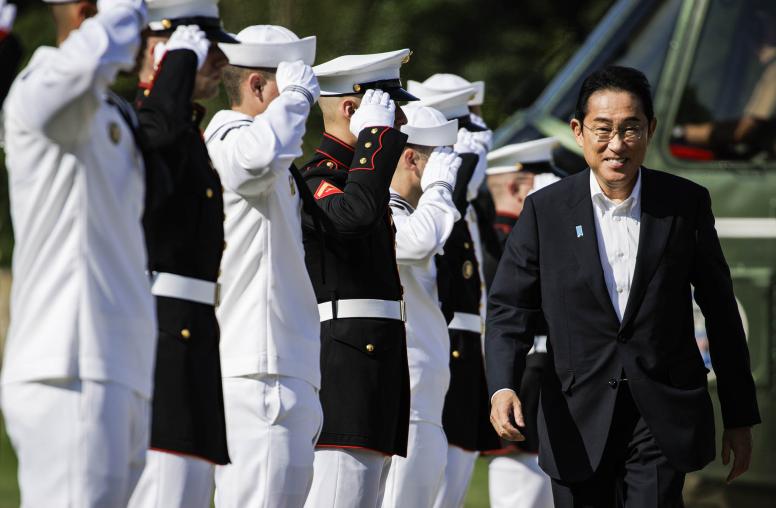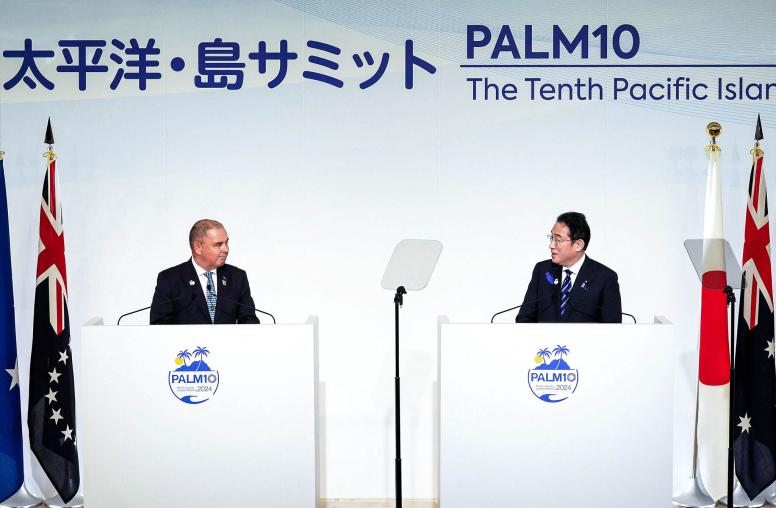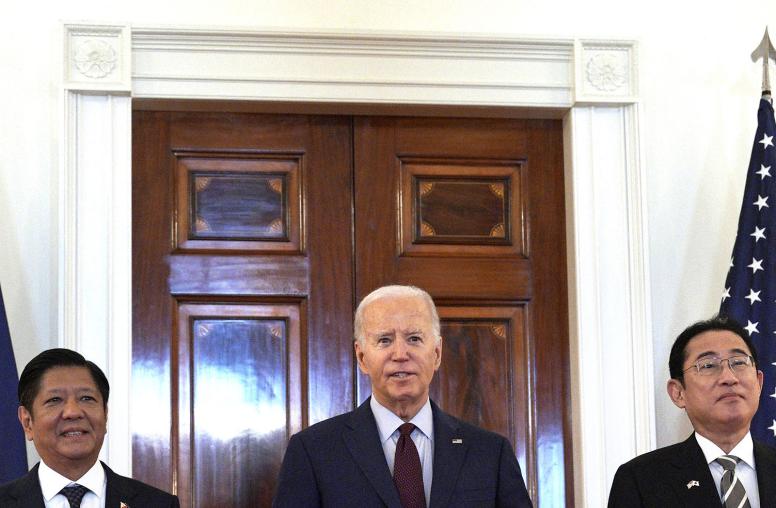Vikram Singh on the U.S.-Japan-Philippines Trilateral Summit
The United States, Japan and the Philippines are holding their first-ever trilateral summit this week. China’s “unprecedented” pressure and aggression over maritime claims will top the agenda. “There’s a fairly clear resolve … to not just let China bully its way to changing the status quo in the region,” says USIP’s Vikram Singh.
U.S. Institute of Peace experts discuss the latest foreign policy issues from around the world in On Peace, a brief weekly collaboration with SiriusXM's POTUS Channel 124.
Transcript
Laura Coates: Joining us now is Vikram Singh from United States Institute of Peace's Asia center. He's a senior adviser. This coming Thursday there is a trilateral summit with Japan and the Philippines and the White House. Here, to give us all the details is Vikram Singh. Welcome and good morning. How are you?
Vikram Singh: Good morning, Laura. I'm doing great. Thanks for having me.
Laura Coates: I'm glad that you're here. Thank you for joining us tell us about this upcoming trilateral summit with Japan and the Philippines.
Vikram Singh: So, this is a pretty unprecedented meeting. It's the first time these three countries have held a trilateral. And it comes at a time when the Philippines is facing really unprecedented pressure from China in disputed territorial waters around the Philippine archipelago. So, the Chinese coast guard ships have been shouldering, water cannoning and otherwise basically trying to press the Philippines away from territory that's disputed between the two countries. So, it comes at a really critical time. And it's a part of the overall effort by the Biden administration to sort of thicken and deepen the alliance network in Asia to help preserve a free and open Indo Pacific.
Laura Coates: Why have there not been these sorts of summits before and why now is it so important that they do?
Vikram Singh: Well, I think the, you know, the traditional American alliance system, which really goes back to the you know, after World War II in the region, has been kind of hub and spoke. A U.S. alliance with Japan, a U.S. alliance with Korea, the ones we think about most but also an alliance with Australia and alliance with the Philippines, we have signed a mutual defense treaty with the Philippines. Those have all been the sort of separate hub and spoke kind of arrangements and what's been happening recently, going back into the Trump administration, as well, and continuing into the Biden administration is a lot more what people call 'mini lateral' activity. So, the quad between Australia, India, Japan and the United States; Korea, Japan, United States trilateral activity. And it's because these countries all see a lot of common challenges. Some of those are climate change and piracy and fisheries and environmental. But the biggest one is that they're worried about the approach China's going to take to asserting its own presence in the region, and really, primarily to how it's going to approach disputed territory, which surrounds China on all sides. It has territorial disputes with countries throughout the region.
Laura Coates: The conversation that will happen on Thursday, what do you think will be the most important priorities that are discussed? And do you expect to have something tangible come out of it?
Vikram Singh: Yeah, you know, it's interesting just yesterday, the United States and Australia and Japan and the Philippines conducted joint maritime exercises in the Philippines' exclusive economic zone. I think we're going to see a lot more on joint patrols. I think we're going to see a lot more on maritime domain awareness, the ability of countries to see what's going on in their ocean areas, what ship activity is happening. I wouldn't be surprised to see something on illegal fishing, which is a major challenge. And a lot of it is done by the Chinese fishing fleet going into other countries territories and harvesting fish. So, I think we can see things in all of those areas. I also think Japan's new overseas security assistance program, which is also unprecedented, the Japanese are actually exporting military equipment and systems and providing security assistance to countries in the region for the first time, really, since World War Two. I mean, since the first time ever, and that has gone initially to the Philippines, they provided maritime radars in the Philippines. So, I think we might see more coordination on how the U.S. and Japan and the Philippines will work together to build Filipino capabilities for military and coast guard security.
Laura Coates: Let's delve deeper into the role that China will play in this in this summit in particular. The Philippines I think you noted in the past, has taken the brunt of Chinese pressure lately and ships being blocked and even rammed by Chinese vessels. Japan and the U.S. have been ramping up their own support including with Japan's first ever I think overseas security assistance going to the Philippines in the form of this coastal surveillance radars. What is happening with this relationship between the Philippines and China and the blockage of their vessels?
Vikram Singh: Yeah, I mean, it's really pretty dire the Chinese are enforcing their claims to territory, which, incidentally, were declared to have no basis international law by the International Court of Justice way back in 2016. And they're showing that rather than talk, they just want to assert their position, take territory, establish new realities on the ground. And so, for the Philippines, relations with China have gotten steadily worse. I think one of the reasons this really matters is, you know, one, the United States and the Philippines do have a mutual defense treaty. So, we have a commitment to help the Philippines if they are attacked. And also, the threshold for conflict is not that high here. I mean, the activities that are happening could extend to something much more serious. Four Filipino sailors were actually injured in a recent water cannoning incident. And so, what if somebody gets killed? What if a ship is sunk? There's a whole bunch of things that could take this to another level. One of the ways it's being controlled is by trying to have it be coast guards that are acting instead of navies, which kind of lowers the threshold a little bit. And so, I think we might also see more announcements about joint coastguard activity that keeps it in a civilian space rather than a military space and can help to manage the tensions better. But everybody's worried about things escalating. As the Philippines and China continue to have this tense dynamic in the region.
Laura Coates: Does this trilateral summit indicate in some way that the United States is going to give either aid militarily or financially support in this endeavor?
Vikram Singh: Well, the United States has already given considerable military assistance to the Philippines as is Japan. And I think we're going to see announcements about deepening that assistance. Most of that is going to be in what you would think of more as defensive capabilities, surveillance capabilities, patrolling capabilities. And the ability to just sort of enforce that the territory the Philippines claim that they're able to sort of protect from Chinese encroachment. Because what we've seen in other incidents a little over a decade ago, another disputed piece of territory, the Chinese just took it, the Scarborough Shoal. And they've sort of pushed the Philippines out over a little dispute and then proceeded to develop and continue and build and militarize that territory and they're doing that in a lot of disputed areas. The Chinese are just sort of taking control, building infrastructure, reclaiming land, adding runways, missiles, you know, landing strips, and they're really militarizing a lot of the disputed territories that they should be negotiating with countries in the region over.
Laura Coates: Does this concern, I mean this trilateral summit with Japan and the Philippines? What is the expected response from China based on this?
Vikram Singh: China will not like this at all. It will portray it as being provocative. It will continue to claim that it is simply protecting its own territory. But the reality on the ground is that there's one country that's being aggressive in these claims rather than negotiating and that's the Chinese. And so, I think we're going to see a diplomatic reaction. And I think the fact that we saw military exercises yesterday between all of these countries plus Australia in those waters as it led to the Chinese deploying maritime and air patrols. And I think we're going to see a step up in Chinese activity, to try to respond and sort of deter this kind of cooperation. But there's a fairly clear resolve in Japan, in the United States and in the Philippines, to not just let China bully its way to changing the status quo in the region.
Laura Coates: Vikram Singh, thank you so much for joining us from the USIP Asia center, a senior adviser. We are all better prepared now for this upcoming trilateral summit with Japan and the Philippines in the United States' White House of this coming Thursday. Thanks for joining us.
Vikram Singh: Thank you, Laura.



